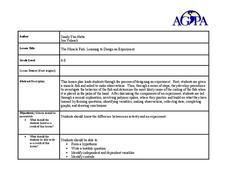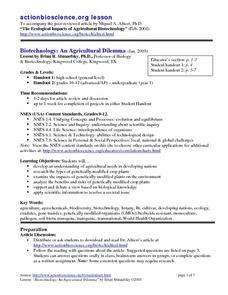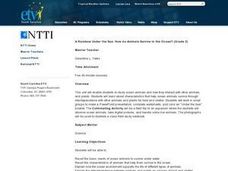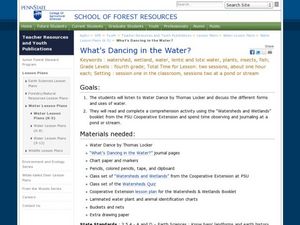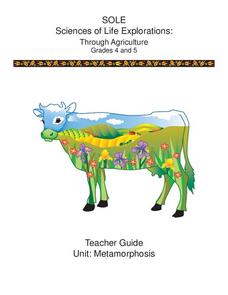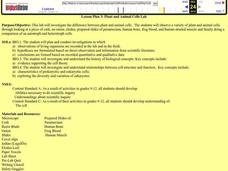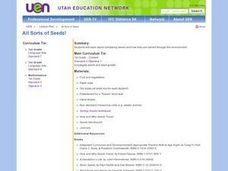Curated OER
Function of a Stem
Fourth graders perform an experiment to test the function of a stem. In this science activity, 4th graders write a description of their investigations. Students also explain how the stem interacts with the rest of the plant. Students use...
Curated OER
Habitat Sunprints
Young scholars recognize various habitats and where they are found. In this habitat sunprints lesson, students observe the contents of habitats and record what the sunprint might represent. Young scholars use blueprint paper and small...
Curated OER
Fishing
Learners explore the techniques and basic needs of the fisherman. In this fishing lesson plan, students view a demonstration of the use of fishing equipment. Learners research Iowa farm ponds and design a class mural from their...
Curated OER
The Miracle Fish: Learning to Design an Experiment
Learners develop procedures to explore the behavior of fish. In this scientific experiment lesson students from a hypothesis, write a question, identify different variables and controls in their experiment.
Curated OER
Forest Friends Forever
Students investigate how to use the senses to gather information about objects such as size, shape, color, texture, sound, position, and change (qualitative observations are utilized throughout this lesson). They investigate and explain...
Curated OER
Biotechnology: An Agricultural Dilemma
Students investigate the types of genetically modified crop plants there are and the benefits and risks of such plants. The agricultural needs in developing nations for this biological knowledge to resolve societal issues is also...
Curated OER
Reading the River - Biological Classification
Youngsters create a list of grocery store items and then work together to categorize them as if they were setting up the shelves of the market. Then they are given a box of miscellaneous objects to practice categorizing. With these two...
Curated OER
A Rainbow Under the Sea: How do Animals Survive in the Ocean?
Second graders read books, watch videos, complete worksheets and participate in class discussions about ocean animals. They, in groups, design PowerPoint presentations on selected marine animals.
Curated OER
What's Dancing in the Water?
Students learn about watershed, as well as the different forms and uses of water. In this water forms lesson, students brainstorm water sources and uses. Students read the book Water Dance and discuss water examples. Students complete a...
Curated OER
Pollination of Flowers by Moths
Turn your classroom into a pollination station as your kids transform into moths or predators trying to survive and aiding in plant reproduction along the way. Using silent party blowers as proboscises, the moths will have two minutes to...
Cornell University
Metamorphosis
Looking for an insect unit that addresses multiple skill strategies? Young entomologists explore multiple life cycles of insects that go through metamorphosis. The brainteasers and mobile activity spark learner interest before guiding...
Curated OER
The Bulbs: Camas and Daffodil
Fourth graders become aware of the importance of the camas bulb to the Nez Perce people, they learn the parts of plants, and gain understanding of the interdependence of Nature. They study about the possible causes and outcomes of global...
Curated OER
Botanical Discoveries
Sixth graders study the chronology of major events of the Lewis and Clark Expedition. They use primary and secondary resources to obtain information about the plants which were identified by Lewis and Clark.
Curated OER
Plant and Animal Cells
Students investigate the difference between plant and animal cells. They observe a variety o plant and animals cells by looking at a piece of cork, an onion, elodea, prepared slides of paramecium, human bone, frog blood, and human...
Curated OER
Adapting to Seasonal Changes in the Environment
Fourth graders discuss how plants and animals, including humans, adapt to climate and seasonal changes. They research the Colville people, and create dioramas that represent life during different seasons for Colville people.
Curated OER
What Foods Contain Products from the Ocean
Fifth graders learn about foods from the ocean. In this ocean products activity, 5th graders brainstorm what foods come from the ocean, fill in a Venn Diagram comparing alginates, carrageenans and beta carotenes. Students make a list...
Curated OER
All Sorts of Seeds!
First graders compare seeds and explore how they are carried through the environment.
Curated OER
Photosynthesis and Biomass Growth
Sixth graders examine renewable energy sources such as ethanol. In this photosynthesis and biomes lesson students complete a project on farming techniques.
Curated OER
What's In The Forest?
Students examine forest food chains and create a forest habitat in the classroom. They are introduced to the concept of interdependence in Nature. They define a simple forest food chain and develop inquiry process skills.
Curated OER
Mercury in the Environment
Students develop abilities necessary to do scientific inquiry. They develop an understanding of chemical reactions, structures and properties of matter. They develop decision-making skills in natural and human-induced hazards.
Curated OER
Cotton Seed Planting
Students using scientific inquiry will observe and record in daily journals their findings on cotton seeds. They measure, graph, and then communicate their discoveries about plants to each other.
Curated OER
Create a Non-native/Invasion Species
Students view a video about non-native/invasion species. They create a non-native/invasion species that they think would have an impact on farming, industry, recreation, or water in the local environment.
Curated OER
Investigating the Soil
Students explore the Earth's crust by researching pH levels and acidity. In this environmental safety lesson, students identify the pros and cons of acidity within soil and how it affects plants. Students collaborate in a pH level...
Curated OER
Ocean Grazers Conclusion
Learners research an ocean species. In this science lesson, students create a research presentation as a conclusion to the ocean grazers unit. Learners present their projects to the class and complete a self-reflection paper.





